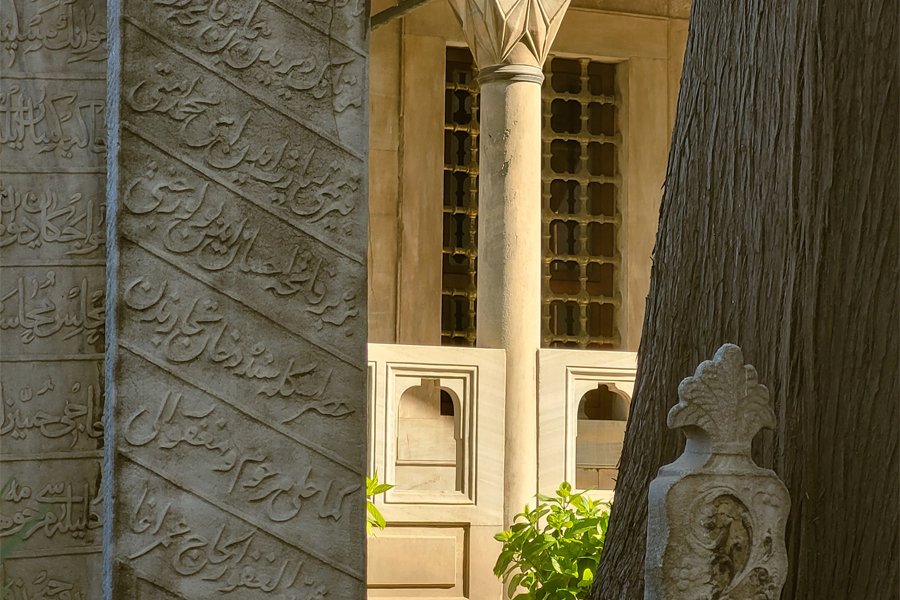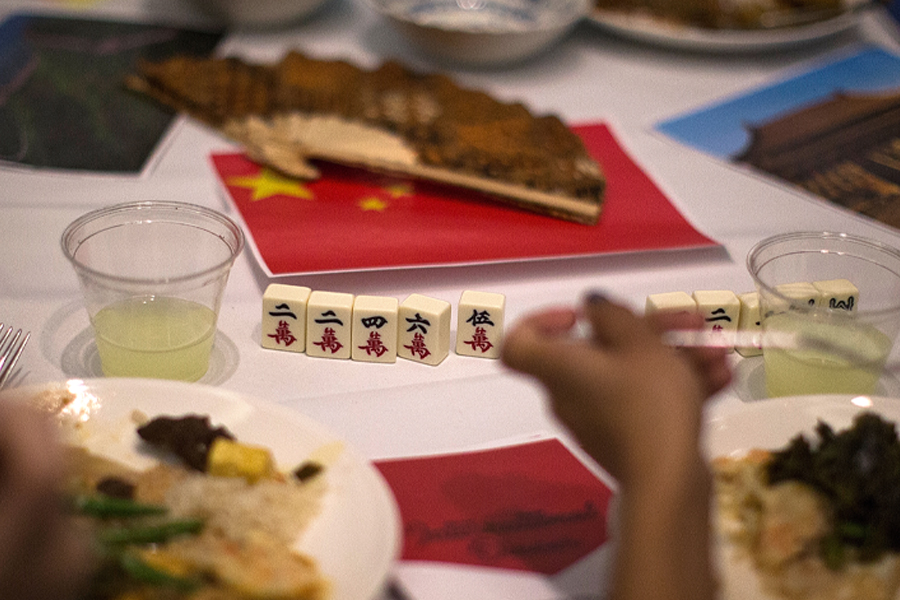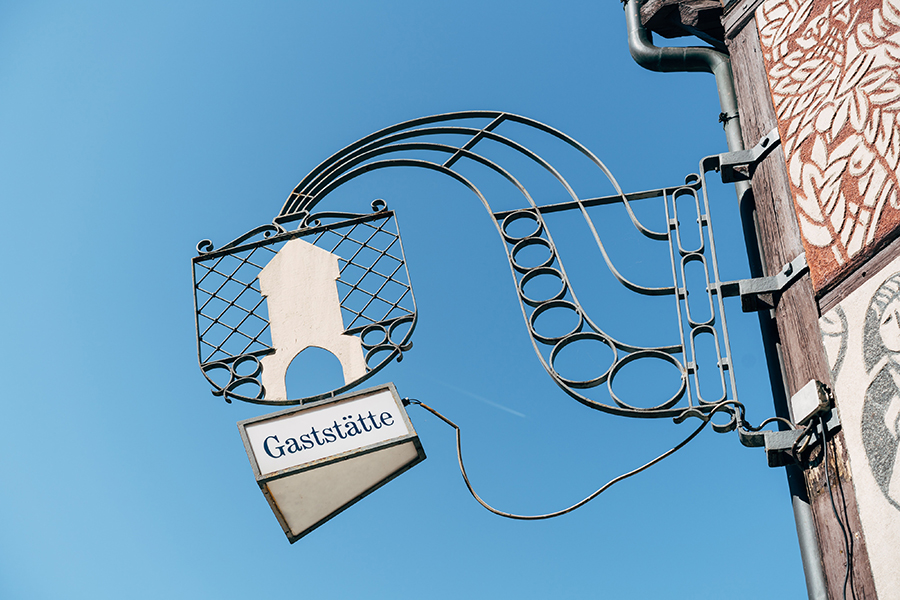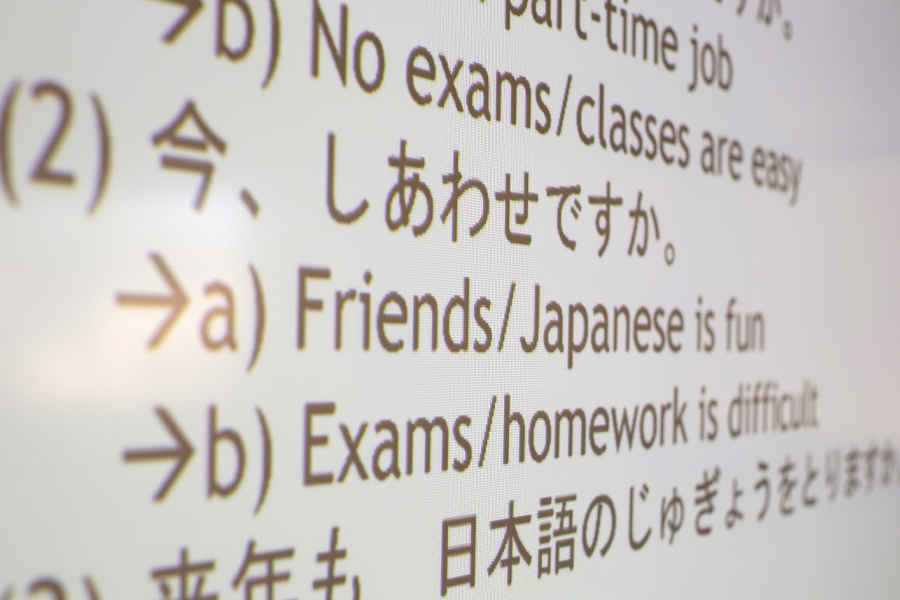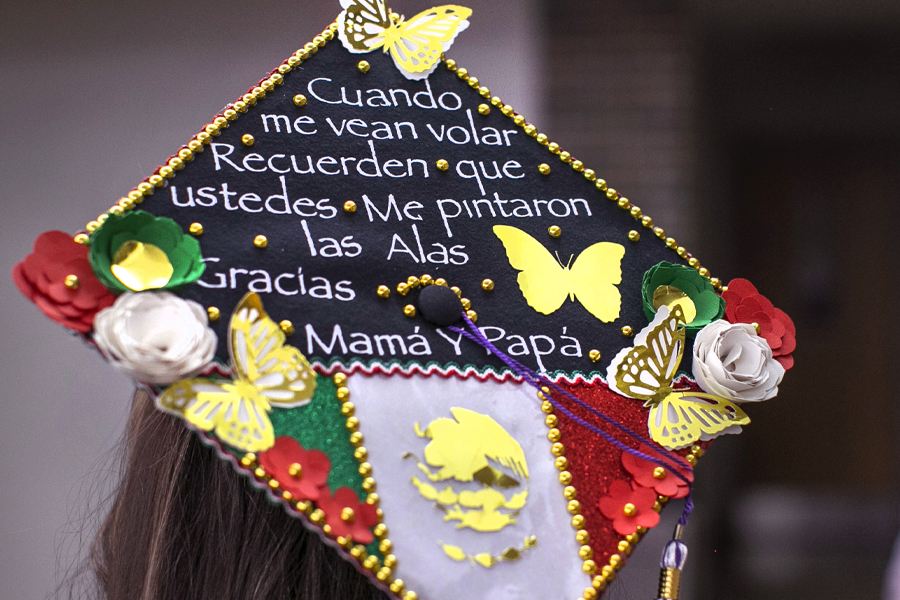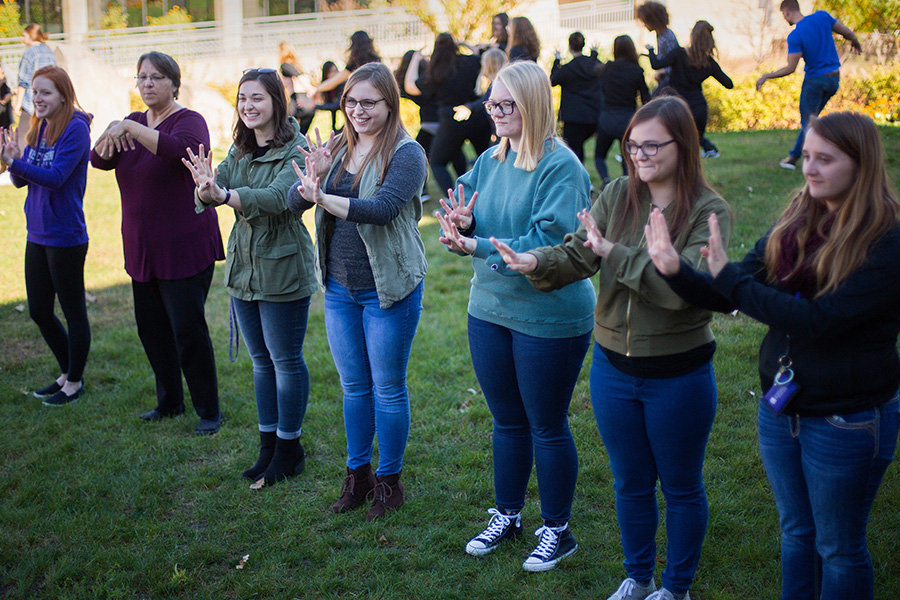DEPARTMENT OF WORLD LANGUAGES AND CULTURES
The Department of World Languages and Cultures serves the mission of the College of Letters & Sciences and the University as a whole by encouraging students to develop diverse perspectives, civic responsibility and engagement, and personal and professional integrity while preparing for careers and lifelong learning. Engaging with a world language benefits our students by improving their ability to make connections across the curriculum with other subjects. The Department offers a comprehensive curriculum in French, German, Spanish, and Spanish as a Heritage Language, as well as an array of courses in Arabic, Chinese, and Japanese. Undergraduate students may fulfill major, College, and University requirements, as well as acquire language skills for other opportunities.
Through our programs, students develop skills in listening comprehension, oral and written communication, and textual literacy, which facilitate awareness and appreciation of the contributions of world cultures to contemporary society. Our courses foster cultural sensitivity and respect through engagement with global languages, ideas, and literatures. Students further develop critical thinking skills through reflecting on the differences and similarities between the target cultures and their own.
The World Languages and Cultures Department's expertise in various languages reaches out into and serves the larger community and region. Faculty, academic staff and/or student interns provide valuable professional assistance with translation and interpreting. Service learning components in some courses help students see real-life applications of their world language skills. These activities benefit area institutions and organizations while creating ties between the university and surrounding communities.
Contact us
Pilar Melero
Department Chair & Professor
Phone: 262-472-3173
Location: Laurentide Hall 3110
Nicole Romero
Department Assistant
Phone: 262-472-1975
Location: Laurentide Hall 3112
Mission Statement
Through linguistic, cultural and literary experiences both in and outside of the classroom, the World Languages and Cultures Department at the University of Wisconsin-Whitewater fosters the development of diverse perspectives, civic responsibility and engagement, and personal and professional integrity while preparing our students for careers and lifelong learning. We work to develop skills in listening comprehension, oral and written communication, textual literacy and cultural competence to facilitate our students’ ability to interact with and appreciate the various cultures in contemporary society. Language mastery improves students’ ability to make connections with other subjects across the UW-W curriculum.
Vision Statement
The World Languages and Cultures Department at the University of Wisconsin-Whitewater seeks to help students become global-minded citizens who are attuned to and knowledgeable of linguistic and cultural variation so that they can interact with, adapt to and succeed in a diverse society.
We strive to respond to the interests and needs of students as they evolve into culturally competent individuals who explore multicultural learning opportunities, prepare for the job market, and develop a genuine interest in serving their communities. With these goals in mind, the World Languages and Cultures Department aspires to:
- Promote interdepartmental collaboration to increase interdisciplinary opportunities for students in diverse fields of study;
- Expand course offerings in linguistics, cultural studies, literature, translation, heritage languages and professional studies and respond to the need for instruction in strategic languages;
- Cultivate openness and sensitivity to other cultures in a variety of contexts;
- Emphasize innovative instruction and develop curricula and assessments based on nationally recognized pedagogies and established standards.
Louis R Betty
Associate Professor
Department(s): WORLD LANGUAGES AND CULTURES
Laurentide Hall 3102 |
(262) 472-7172
Melanie Czarnecki
Lecturer 1
Department(s): WORLD LANGUAGES AND CULTURES
Laurentide Hall 3134 |
(262) 472-1241
Alicia de Gregorio
Professor
Department(s): WORLD LANGUAGES AND CULTURES
Laurentide Hall 3126 |
(262) 472-5071
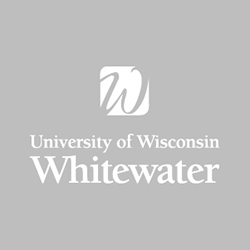
Luzma Ede-Hernandez
Associate Professor
Department(s): WORLD LANGUAGES AND CULTURES
Laurentide Hall 3106 |
(262) 472-1064

Hala Ghoneim
Professor
Department(s): WORLD LANGUAGES AND CULTURES
Laurentide Hall 3116 |
(262) 472-5060

Timothy J Holian
Senior Lecturer
Department(s): WORLD LANGUAGES AND CULTURES
Laurentide Hall 3108 |
(262) 472-1065
Lisa Jane Huempfner
Associate Professor
Department(s): WORLD LANGUAGES AND CULTURES
Laurentide Hall 3132 |
(262) 472-5074
Pilar Melero
Professor
Department(s): WORLD LANGUAGES AND CULTURES
Laurentide Hall 3110 |
(262) 472-3173
Jodie Parys
Professor
Department(s): WORLD LANGUAGES AND CULTURES
Laurentide Hall 3130 |
(262) 472-5070
Nicole C Romero
Department Assistant
Department(s): WORLD LANGUAGES AND CULTURES
Laurentide Hall 3112 |
(262) 472-1975

Pamela Tesch
Adjunct Instructor
Department(s): WORLD LANGUAGES AND CULTURES
Laurentide Hall 3122 |
(262) 472-1053
Sheila Turek
Associate Professor
Department(s): WORLD LANGUAGES AND CULTURES
Laurentide Hall 3104 |
(262) 472-1066
There are numerous scholarship opportunities available to students, both through the university, the College of Letters and Sciences and the World Languages and Cultures Department. To make life a little easier, all of the university's scholarship applications and requirement listings are available online.
Language Scholarships and Awards
Arabic
- The Qatar Scholarship Program
- Arabic language students may master their skills under this intensive program at Qatar University in Doha for an academic year. It is a non-degree program, but students will receive a certificate upon completion of the academic year. Credit will also be awarded. The scholarship includes tuition; room and board in university dorms; round-trip airfare; local transportation; and books.
- Visit for more information.
- AL Muammar Scholarship for Journalism
- If you're pursuing degrees in both Arabic and journalism, you should consider this $5,000 scholarship sponsored by the Arab American Institute Foundation. Applicants should be committed to journalism and possess a sensitivity to Arab American issues. Community involvement and initiative in social advocacy and civic empowerment are required to apply. Applicants must demonstrate journalistic and academic ability, as well as financial need.
- Benjamin A. Gilman International Scholarship
- This scholarship is intended for U.S. undergraduates who plan to study abroad. The average award is $4,000. Recipients with backgrounds in supercritical languages like Arabic are then eligible for an additional $3,000 Critical Need Language Supplement from the Gilman Scholarship Program.
- "Dream Deferred" Essay Contest on Civil Rights in the Middle East
- Interested students should visit www.hamsaweb.com and view the writing prompts. One grand prize winner will receive a $2,000 scholarship. One second place winner will receive $1,500. Three runners-up will receive $500 each.
- Critical Languages Scholarship Program
- This culturally enriching program offers language instruction overseas to undergraduate students. The program lasts from seven to ten weeks and is fully funded by the government in an effort to increase the number of students who become proficient in critical languages such as Arabic.
Japanese
- Benjamin A. Gilman Scholarship
- The Bureau of Educational and Cultural Affairs of the U.S. Department of State sponsors The Gilman Scholarship every year. Their aim is to cultivate friendly, sympathetic, and peaceful relations between the people of the U.S. and other countries. This relationship fosters students' ability to adopt significant roles in the global economy and the increasingly interdependent world. Therefore, the Benjamin A. Gilman International Scholarship Program offered U.S. undergraduate students, who are otherwise unable, the opportunity to pursue academic studies or credit-bearing, career-oriented internships abroad.
- Boren Scholarship
- The Boren Scholarship is for highly motivated individuals who wish to work in the federal national security arena. To accept funding, Boren Scholars must commit to working in the federal government for at least one year after graduation. The national Security Education Program funds Boren Scholarships to provide U.S. undergraduate students with a unique opportunity to study less commonly taught languages in world regions critical to U.S. interests. These areas include Africa, Asia, Central and Eastern Europe, Eurasia, Latin America, and the Middle East.
- Bridging Japan Scholarship
- The Bridging Project funded by the US-Japan Bridging Foundation due to generous contributions from a number of corporations, private foundations, and individual donors to offer scholarships to U.S. undergraduate students participating in study-abroad programs in Japan. There are 100 scholarships awarded each year to assist students with the travel and living expenses they accumulate while abroad. Bridging Scholarships are $2,500 for students who are pursuing semester-long programs and $4,000 for students pursuing academic year programs.
Spanish
- Aldo & Adriana Busot Scholarship
- The Aldo and Adriana Busot Scholarship is available to juniors and seniors majoring in languages and literature at the University of Wisconsin, Whitewater.
If you have taken language classes previously and would like to continue taking French, German, or Spanish coursework at UWW, then you will need to take the appropriate World Language placement exam. These are available only as online, unproctored exams. Please take the test at least 2 weeks before you attend a SOAR, so your scores can be processed and will be available for course registration during the event.
Please contact Pilar Melero, the Chair and Coordinator of the World Languages Department if you are:
- A heritage speaker/speaker of Spanish: The World Language Department Coordinator will determine whether or not you should take the UW System Spanish Placement test.
- Interested in taking Arabic, Chinese, or Japanese and have prior experience with that language.
Language Testing International (LTI) provides language proficiency testing for both assessment and professional certifications. The two tests offered to UW-Whitewater students are the OPIc and the iWPT. UW-Whitewater students must take the following exams:
- College of Education & Professional Studies majors seeking World Language, ESL, and Bilingual language teaching certification: OPIc & iWPT
- College of Education & Professional Studies minors seeking World Language, ESL, and Bilingual language teaching certification: OPIc & iWPT
- College of Letters & Sciences French, German, or Spanish majors (non-Education): OPIc only
- College of Letters & Sciences French, German, or Spanish minors (non-Education): no exam required
Registration & Scheduling:
During the Testing Center's reorganization, please use these instructions to schedule an online exam with a remote proctor.
Please see how to register for the OPIc Exam.
A travel study is academic class that takes place on campus followed by an international faculty-led course work that typically runs for ten days up to four weeks. This global opportunity is ideal for students who are unable to do a traditional study abroad program or want to build on their global experiences.
Arabic
Arabic is a highly regarded academic program at UW-Whitewater, and one of three languages shared with other UW-System universities (the other two are French and Japanese). The two-year program introduces students to the Arabic language and to Arab cultures, preparing them for careers in politics, history, business, and other fields. Students learning Arabic will:
- Interact with speakers of Arabic and engage with their experiences, backgrounds, and traditions.
- Feel more confident in their ability to learn other languages, especially Semitic languages since many words of Semitic languages are derived from Arabic.
- Gain insights into the cultural, religious, and political forces that influence the Arab world.
- Join the estimated 300 million speakers of Arabic, the fifth most commonly spoken language in the world (preceded by only Mandarin Chinese, English, Spanish, and Hindi/Urdu.)
- Become part of the growing number of college students studying Arabic. From 2002 to 2009, enrollments in Arabic courses increased by 231 percent (10,584 in 2002 to 35,083 in 2009) (Modern Language Association of America.)
Chinese
The two-year UWW Chinese language program offers comprehensive training in Mandarin Chinese-putonghua (普通话, common speech, as it is called in mainland China) or guoyu (国语, national speech, as it is called in Taiwan). Mandarin Chinese is an official language in China, Singapore, and Taiwan. It is the official language recognized by the United Nations. The program adopts the simplified Chinese characters in writing, allowing students access to a well-rounded education. Courses taught include Elementary and Intermediate Chinese and students learning Chinese will:
- Be introduced to the context (social, historical, and cultural) in which the language is shaped
- Gain communicative competence in listening, speaking, reading and writing.
- Develop their language skills and gain cross-cultural understanding of the values, attitudes, and beliefs of Mandarin-speaking cultures through well-structured and interactive classroom instruction.
- Develop linguistic and cultural competencies they can combine with other professions for careers in international fields.
- Have the ability to communicate in the most spoken language in the world.
French
UW-Whitewater students have the opportunity to major or minor in French through courses in professional French, literature, culture, phonetics, translation, and civilization as well as study abroad. French is the international language of such fields as: Fashion, Fine Cuisine, Theater, Dance, and Architecture. It is one of the official languages of many international organizations, including
- The United Nations
- NATO
- Amnesty International
- FIFA
- UNESCO
- World Trade Organization
- The European Union
- The International Red Cross
French is spoken by 200 million people on five continents and is an official language in 29 countries. Visit the Ministry for Europe and Foreign Affairs page to see how influential French is globally!
Students learning French will:
- Gain entrance to the international job market. According to the French consulate page, “An ability to speak French and English is an advantage in the international job market. A knowledge of French opens the doors of French companies in France and other French-speaking parts of the world (Canada, Switzerland, Belgium, and North and sub-Saharan Africa). As the world’s fifth biggest economy and number-three destination for foreign investment, France is a key economic partner.”
- Earn linguistic and cultural competencies for careers in government, diplomacy, politics, travel, fine cuisine, entertainment, the arts, and business, among many others.
German
German remains one of the most valuable languages in Europe and around the world today. Not only is it the/an official language of five countries (Austria, Belgium, Germany, Lichtenstein, Luxemburg, and Switzerland), but it also is used in many neighboring countries as well (parts of the Czech Republic, Denmark, France, Italy, Poland, Slovakia, etc.). In fact German is the most widely spoken language in the European Union. German language and culture also remain vital in the United States, where more than 40 million Americans claim German ancestry. German-Americans make up the largest self-reported ancestry group within the United States, accounting for roughly 49 million people and approximately 17 percent of the population of the nation. Some states in the Upper Midwest contain well over 50 percent German heritage. Also many leading German corporations and smaller businesses have branch operations in the United States, creating significant economic growth and employment opportunities on an ongoing basis.
Students learning German will:
- Gain access to a rich cultural and scientific tradition, as evidenced by the number of German-speaking holders of the Nobel Prize: 27 in Chemistry, 25 in Medicine, 22 in Physics, 7 in Literature, 4 Peace Prizes, and 1 in Economics. Therefore it is no surprise that in the United States, 40 percent of scientists recommend the study of German. (Source: DAAD - "German in Science and the Humanities")
- Access careers with higher income potential. Learning German has a higher payout for those who use it in professional life. (The Economist 2014)
- Have opportunities to study, live, and even work in Germany. There are numerous established, reputable study abroad programs to choose from, and the German government awards a generous number of scholarships and other support to study in Germany. Working holiday visas are available for young people from a range of countries, and special visas are offered to skilled workers and professionals.
Japanese
Students of Japanese at UW-Whitewater can choose to major or minor in Japanese Studies. The three-year Japanese language program offers courses designed to build a solid foundation of all four language skills and promote the development of language proficiency and cultural competence. In addition to the course offerings at UW-Whitewater, through a collaboration with UW-Oshkosh, students are given the option to take courses taught at UW-Oshkosh on-line. Students learning Japanese will
- Be able to combine their interest in Japanese with a degree in business, education, history, media arts and game development, international studies, and science.
- Have the opportunity to use Japanese language outside the classroom by working with advanced-level Japanese tutors at the Mary Poppe Chrisman Success Center.
- Enjoy memberships in popular student organizations such as the Japanese Anime & Culture Society and the Japanese Language Club. Students learn new Japanese phrases and can participate in lively discussions about interesting aspects of Japanese culture with their new-found friends.
- Practice Japanese communication skills together with exchange students and an ALLEX Japanese Teaching Fellow from Japan.
- Be eligible to join a year-long or semester-long study-abroad program. Currently, UW-Whitewater has exchange programs with Sophia University in Tokyo, Kansai Gaidai University in Osaka, and other partner universities throughout Japan.
- Have the option of applying to the Guy Healy summer internship program where they will teach English to Japanese youth at various locations throughout Japan.
- Have the opportunity to participate in travel study to Japan which is offered periodically to students during the summer.
Spanish
Spanish has a rich and long history in the U.S. Arriving on the shores of Florida with Ponce de Leon in 1513, it is the oldest European language spoken in what is now the United States. Steeped in the hues of existing native Indigenous languages it has encountered on its American journey for more than 500 years, and in the sounds and rhythms of Afro-Caribbean cultures, Spanish in the U.S. is a living, vibrant language that transforms and evolves through daily contact with English. Our courses reflect the language's deep roots while exploring current language trends through courses in literature, phonetics, history, and other cultural markers. Students also have access to a growing array of professional Spanish courses. Students learning Spanish will:
- Stand out as job candidates in any field such as business, education, social work, medicine, public relations and journalism, the legal professions, non-profit work, among many others
- Have a strong base to pursue careers in translation and interpretation.
- Possess the cultural and linguistic capital to access careers in international fields.
Aside from the above opportunities, our strong Spanish for Heritage Speakers program will prepare student to:
- enhance existing linguistic and sociocultural competences
- gain the confidence they need to take full advantage of their rich cultural and linguistic heritage in any field they choose as a career
Finally, students majoring and minoring in Spanish will have access to high impact practices. They will be able to:
- study abroad
- volunteer in the Latinx/a/o/é community
- join student organizations where they can speak and use Spanish while promoting their cultural heritage
- intern with a company or organization that requires Spanish skills
- take classes that contain a Service Learning component
- do undergraduate research in or related to the Latinx/a/é/o community
- work as a tutor for Spanish classes
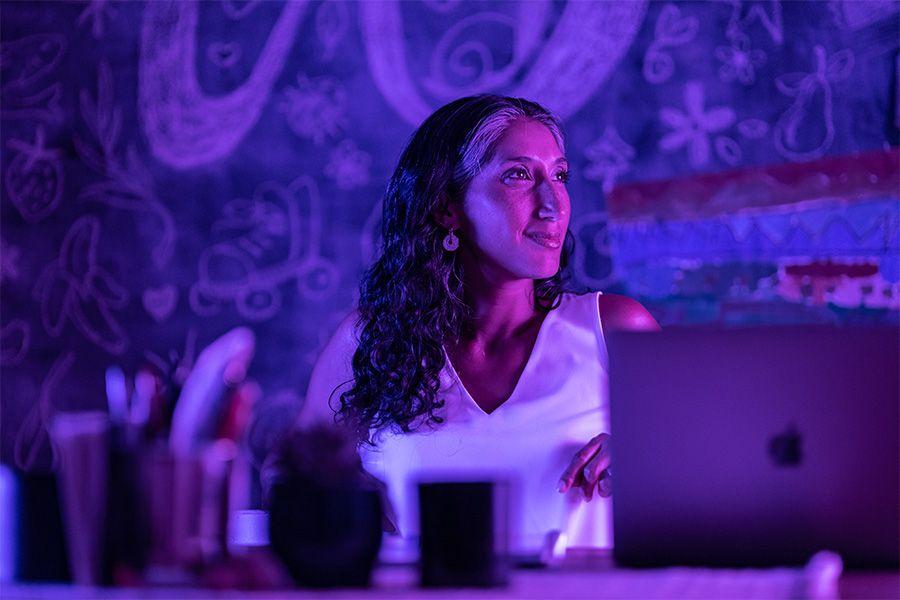
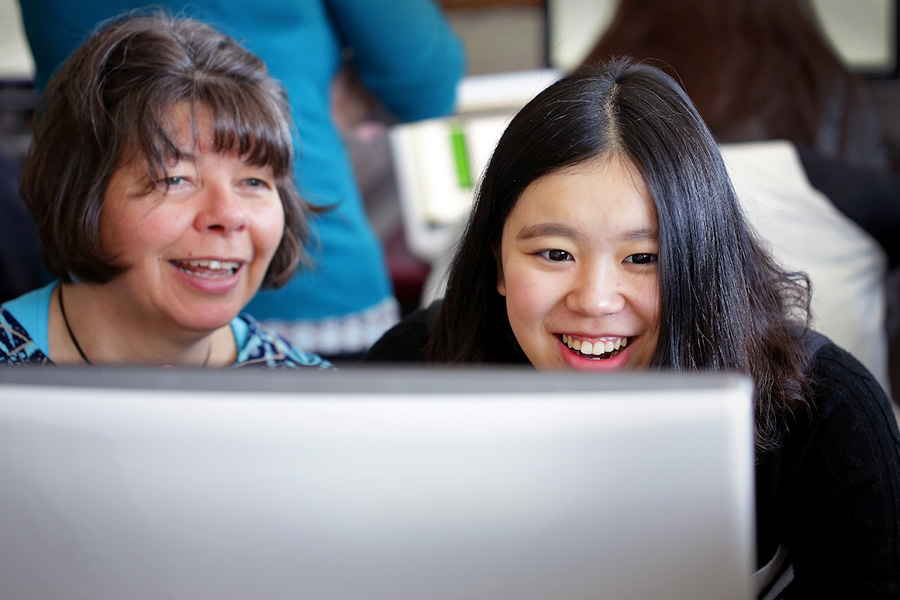



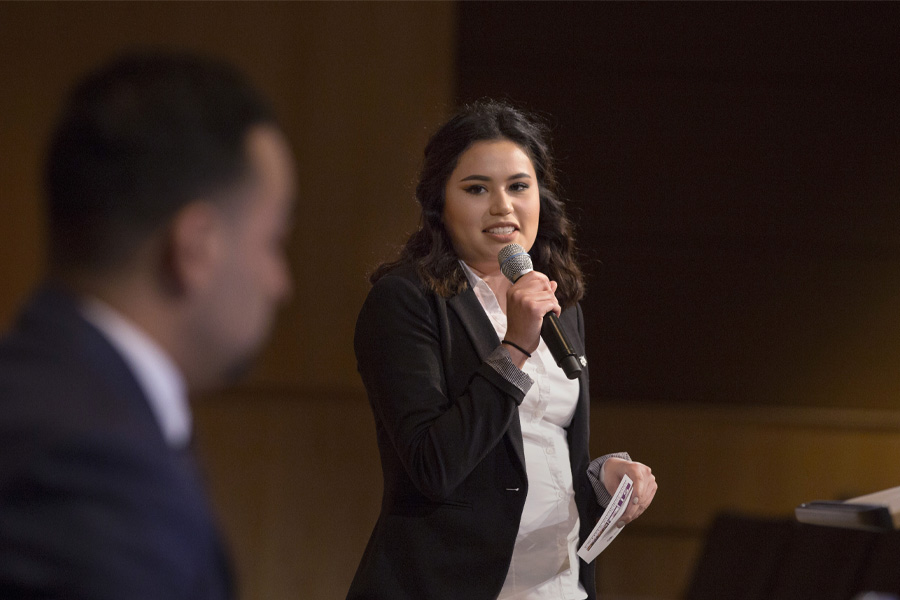
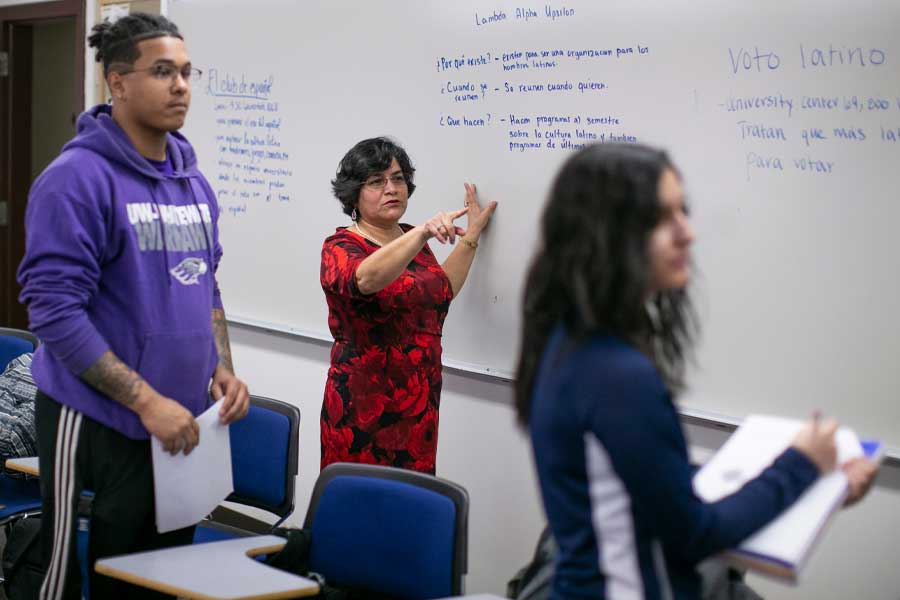
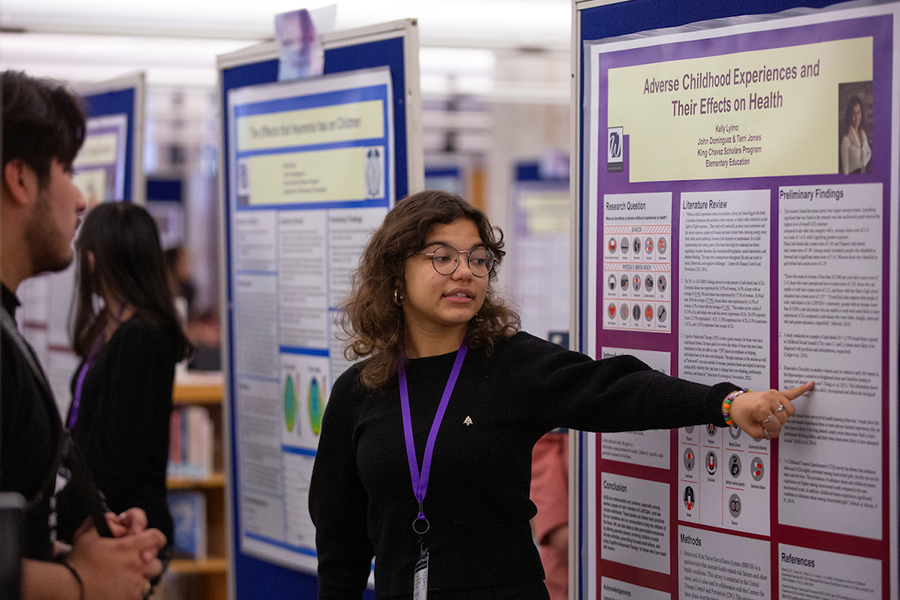
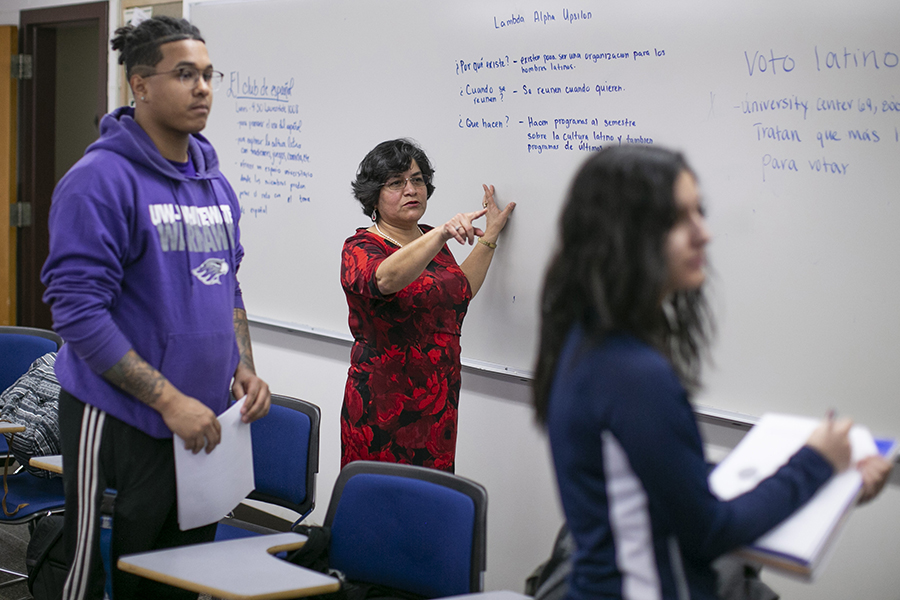
English Composition and Literature
Online Graduate CertificateThe Graduate Certificate in English Composition and Literature is designed to enhance the skills and knowledge of educators and to help them attain the credentials required for teaching college-level courses, including courses offered for dual-enrollment.
ESL/Bilingual-Bicultural
MinorEnglish as a second language (ESL) and Bilingual-Bicultural Education are exciting and rapidly growing fields in need of many dedicated and well-prepared teachers. With our minor, take courses focused on integrating inclusive cultural and linguistic knowledge into the elementary and high school curriculum of your future classroom.
French
Major/Emphasis, MinorFrench, the language of love, fashion, cuisine and some of the greatest literary, artistic and philosophical influences of all time. With a French degree, you will pave your way to careers in teaching, translation, travel and tourism, and foreign service.
German
Major/Emphasis, MinorAs a relative to English, German has long roots in science, and is known for its intricate history, and large culture in Wisconsin. In our program, students will gain communication skill across several German-speaking countries, and pave the way to careers as teachers, translators, academics, and government and business leaders.
Japanese Studies
Major/Emphasis, MinorGain an understanding of Japan, its culture and the Japanese language. Explore Japanese history, politics, culture, literature, religion, society, geography, and gender and family relations.
Professional Spanish
MinorHone and advance your Spanish skills in preparation for a professional career, from business to law to healthcare.
Spanish
Major/Emphasis, MinorLearn one of the most prevalent languages in the United States and the world. Fluency in Spanish will unlock multiple careers as a teacher, translator, and travel agent, not to mention your skills will be incredibly marketable, from business to government to nonprofits. ¿Estás listo?
Spanish Education
Major/Emphasis, MinorLearning a new language is a priceless experience for children's growing minds. Be the person who encourages this growth with a Spanish Education major. UW-Whitewater will provide you with courses on Spanish phonetics, civilization, and literature, as well as middle and secondary education/curriculum, properly preparing you for a career in teaching Spanish.
World Languages Education
Major/EmphasisAs the world has grown smaller, the importance of fluency in world languages has only grown. At UW-Whitewater, your love of languages will be encouraged and fostered to serve you well into the future.


